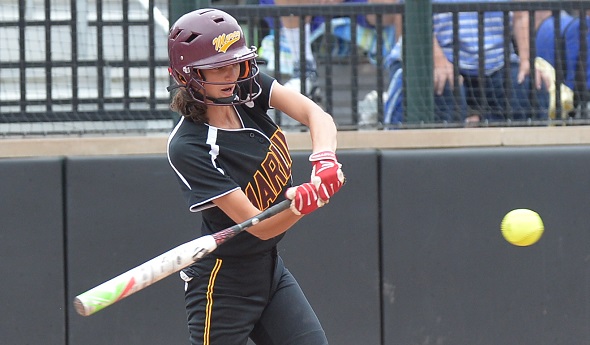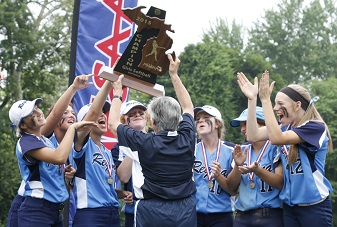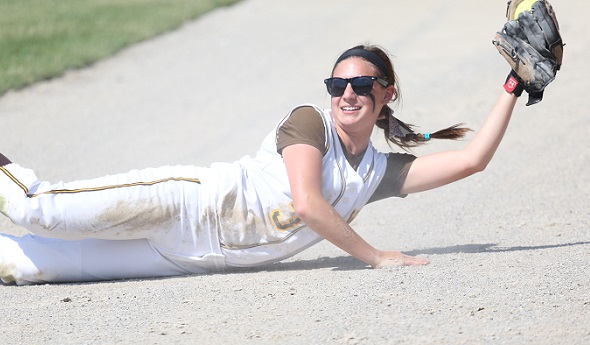
Detroit Powers Succeed Amid Lower Numbers
By
Tom Markowski
Special for Second Half
April 20, 2016
Participation in spring sports, following a similar decline in student-aged population in Michigan, has been on a decline statewide over the last decade.
 But while some like baseball have experienced a slight bounce-back over the last few seasons, softball in particular has seen its numbers continue to fall.
But while some like baseball have experienced a slight bounce-back over the last few seasons, softball in particular has seen its numbers continue to fall.
Coaches and administrators in the Detroit area point to a number of factors intertwined that produced a snowball-like effect – and now it seems to have come to a head.
Three softball programs in the Catholic League Central, a division that competes at a high level statewide, don’t have sufficient numbers to field a junior varsity this spring. Many programs don’t sponsor freshmen teams for the same reason.
But for schools like Birmingham Marian, Farmington Hills Mercy and Livonia Ladywood not to have a junior varsity softball team is quite shocking to some – especially considering that Mercy enters this season ranked No. 3 in Division 1 and Ladywood is No. 2 in Division 2.
Specialization fallout
Marian athletic director Dave Feldman isn’t among those stunned. He saw this coming. Feldman points to the 2007-08 school year when the Michigan High School Athletic Association was forced, by court decision, to switch the volleyball season from the winter to the fall and the girls basketball season from the fall to the winter.
Feldman has a daughter, a freshman at Marian, who participated on the junior varsity volleyball team this fall. When that season was over she joined a club volleyball team. Feldman said the club volleyball season begins in December and continues on into June.
“It’s not AAU,” Feldman said. “But you need to be an AAU member (to play). They play all of the time. Heck, they played on Easter Sunday. And every club is filled.”
The pressure on athletes to play year-round is arguably greater now than it ever has been, and can come from coaches, peers and family – based on a frequent misconception that if athletes want to earn a scholarship, they better keep up with the Joneses or be left behind.
Feldman said he’ll back his daughter with whatever decision she makes. If she wants to play volleyball nine or 10 months a year, he’ll support that. But Feldman said, financially, it’s getting out of hand. He estimated between the cost of airfare, hotels and meals that he’ll spend $6,500 in support of his daughter playing club volleyball.
And, according to Feldman, the increase in attention on volleyball is affecting participation in other sports.
“(Girls) basketball is fighting for its life,” he said. “Our field hockey program (a fall sport) is fine. Our lacrosse teams are fine.
“We have 15 playing volleyball at all three levels. We had 16 (total) try out for softball and we made two cuts. We haven’t had a JV the last two years. The last time we had a freshman (softball) team was in 2004 or 2005. The last few years the numbers have dropped off. It’s the specialization.”
Simply signs of change?
Warren Regina is another member of the Catholic League Central. Regina athletic director Diane Laffey also is the head coach for softball and basketball, and she said she thinks lacrosse has drawn some athletes away from softball – which makes sense, although the total number of girls playing high school lacrosse in Michigan has increased only about 1,000 over the last decade, while softball participation is down 4,000 athletes over the same time.
One should not use Regina as an example of decline – Laffey’s team won the Division 1 championship last spring and fields a softball team at all three levels. At the same time, Regina also has seen a rise in participation in lacrosse. There are 18 playing for both the varsity and junior varsity this spring, the highest participation in school history.
Mercy varsity softball coach Alec Lesko said, simply, that times have changed. Mercy reached the Division 1 Semifinals last season, just as Ladywood did in Division 2 the year before – yet despite this success, Mercy’s number of softball players also has declined.
 “(The students) have many more options,” Lesko said. “In addition to their school work there’s band, theatre, honors society clubs. In the past kids would play three sports and be in the band. All of my daughters were multi-sport athletes. By their sophomore year they had to make a decision (on which sport they would concentrate).
“(The students) have many more options,” Lesko said. “In addition to their school work there’s band, theatre, honors society clubs. In the past kids would play three sports and be in the band. All of my daughters were multi-sport athletes. By their sophomore year they had to make a decision (on which sport they would concentrate).
“It’s also economics. They want to earn a scholarship. You hear horror stories about (the cost of) student loans. Even the big schools have trouble getting the (students to play softball).
“As far as college, and I can only speak about softball, the Big Ten coaches want the player they recruit to play other sports,” Lesko added. “I hope to have a JV program next year. A player that misses 30 JV games, we will feel that crunch later. There are those who think JV softball is a waste of time, that you should just compete in travel (during the summer). We will get some of those kids. Those who compete in travel then come to us as sophomores.”
Reasons for optimism
Don Peters is the softball coach at Clarkston, and between coaching travel and at the high school level he’s put in 35 years. He coached travel before taking over the Clarkston program. Peters said the two complement each another, or at least they should.
“I know some disagree,” he said. “The girls have a lot of choices in the spring. Look at all of the sports they can play. I don’t think lacrosse has cut into the numbers. Not yet, but it’s probably going to. We haven’t been affected. We have 45 (covering three teams) in our program. We really push softball in our community because it’s been established.”
Peters said coaches in softball and baseball need to make the game enjoyable, and one way is to reward those who chose to participate by playing them on a regular basis. A student who is No. 14 or 15 on a squad often will play once a week and, with all of the options available, isn’t willing to put in the practice time for limited game action.
Mercy senior first baseman Abby Krzywiecki played a variety of sports before her freshman year. It was then she decided that softball would be her main sport and she chose to pour all of her energy into it.
She said it’s not all gloom and doom for her sport.
“We had a small freshmen class (last year),” she said. “When I came in we had a large class. It was one of the biggest. It’s not that we’re not getting softball players. In the travel world, it’s becoming more intense. We have more younger people playing. The sport is getting more intense. The talent level is getting higher.”
 Tom Markowski is a columnist and directs website coverage for the State Champs! Sports Network. He previously covered primarily high school sports for the The Detroit News from 1984-2014, focusing on the Detroit area and contributing to statewide coverage of football and basketball. Contact him at [email protected] with story ideas for Oakland, Macomb and Wayne counties.
Tom Markowski is a columnist and directs website coverage for the State Champs! Sports Network. He previously covered primarily high school sports for the The Detroit News from 1984-2014, focusing on the Detroit area and contributing to statewide coverage of football and basketball. Contact him at [email protected] with story ideas for Oakland, Macomb and Wayne counties.
PHOTOS: (Top) A Farmington Hills Mercy hitters prepares to connect during last season's Division 1 Semifinal against Caledonia. (Middle) Warren Regina coach Diane Laffey hoists her team's championship trophy after the Saddlelites downed Caledonia in the Final last spring.

'Good Enough' Turns Great as Warriors Advance
June 14, 2013
By Bill Khan
Special to Second Half
BATTLE CREEK — Hannah Leppek pitched a one-hit shutout Friday, not an easy achievement against a hot-hitting softball team playing on the opposite side in an MHSAA Semifinal.
Yet the Bay City Western junior wasn't thrilled with her performance, which just reaffirms that the great ones all have a bit of a perfectionist streak in them.
Leppek struck out eight but walked five and hit a batter, as Western beat Garden City 1-0 in Division 1 at Bailey Park.
The Warriors won on a walk-off sacrifice fly by senior Hannah Batschke.
"Actually, I didn't feel that my pitching was on, but it was good enough to obviously get the win," Leppek said. "Tomorrow I can tell you it will be on. It's going to be a big game.
"I have higher standards for myself. I just felt like my pitches weren't moving as much as they usually were, and I wasn't as accurate as I usually am. In my opinion, it wasn't a perfect shutout."
Her 19th shutout of the season put Western in the MHSAA Final for the first time and against Mattawan, which beat Romeo 3-2 in the other Semifinal.
"It's surreal," Leppek said. "I feel like it hasn't hit me yet, the immensity of it. I feel like next week I'll wake up and it will hit me: 'Oh, I was in the state championship game.'"
Western coach Rick Garlinghouse concurred that it wasn't a vintage performance by Leppek.
"She normally doesn't walk five, and she gets a few more strikeouts than that," he said. "What I'm proud of is she kept her focus, and she was still able to give us a chance to win the game."
Leppek pitched out of a bases-loaded two-out jam in the sixth when she got Julene Pummill to strike out swinging at a high pitch.
Western's best chance to score before the seventh came in the second inning when Pummill ran down a fly ball heading for the gap in right-center off the bat of Batschke with two outs and a runner on second.
The winning rally began when Kelsie Popp led off the seventh with a double. Ashtyn Decatur reached on an error on a bunt attempt and advanced to second. With the outfield drawn in, Batschke hit it deep enough to force left fielder Allie Lynn to backpedal to make the catch, giving her no chance of throwing out Popp at the plate.
"I just want to go out and make my team proud, no matter what we do," Batschke said. "I just go out every at bat like it's an average game, not any big game or anything. I'm relaxed. It sounds bad, but I really do bad under pressure. So I just go out and have fun."
The title game will be a rematch of a 2011 Semifinal that Mattawan won, 3-0.
Mattawan 3, Romeo 2
The Wildcats reached the championship game for the third straight year on the strength of a three-run fifth inning.
Romeo took a 1-0 lead in the top of the fifth before Mattawan erupted for the winning rally.
 Emma Toner started the inning by reaching base on an error, then scored the tying run on an error. A single by Kyla Nickrent broke the tie, and a double by Abby Stoner made it a 3-1 game.
Emma Toner started the inning by reaching base on an error, then scored the tying run on an error. A single by Kyla Nickrent broke the tie, and a double by Abby Stoner made it a 3-1 game.
"Sometimes it's just the second or third time through the lineup that it will happen," Mattawan coach Alicia Smith said. "I knew it was going to happen, because we put base runners on in every inning but the fourth. They were there in scoring position. We were just one hit away from breaking it open. It was just a matter of time."
Romeo scored a run in the sixth, but was set down 1-2-3 in the seventh by Allie Havers. Havers allowed only three hits, struck out 10 and didn't issue a walk.
Mattawan won the Division 1 title two years ago, outscoring three opponents by a combined 27-0 in the final round, before losing 2-1 to Hudsonville in last year's title game.
"In 2011, it was fairly easy for that group," Smith said. "They breezed right through the tournament and never had any close games. These kids have to battle every game, every inning, every pitch. It makes it very special."
PHOTOS: (Top) Bay City Western rightfielder Madison Brewer holds up the ball as evidence off a catch in the Warriors' 1-0 win over Garden City. (Middle) A Mattawan hitter makes contact during the Wildcats' Semifinal win over Romeo. (Click to see more from Hockey Weekly Action Photos.)

